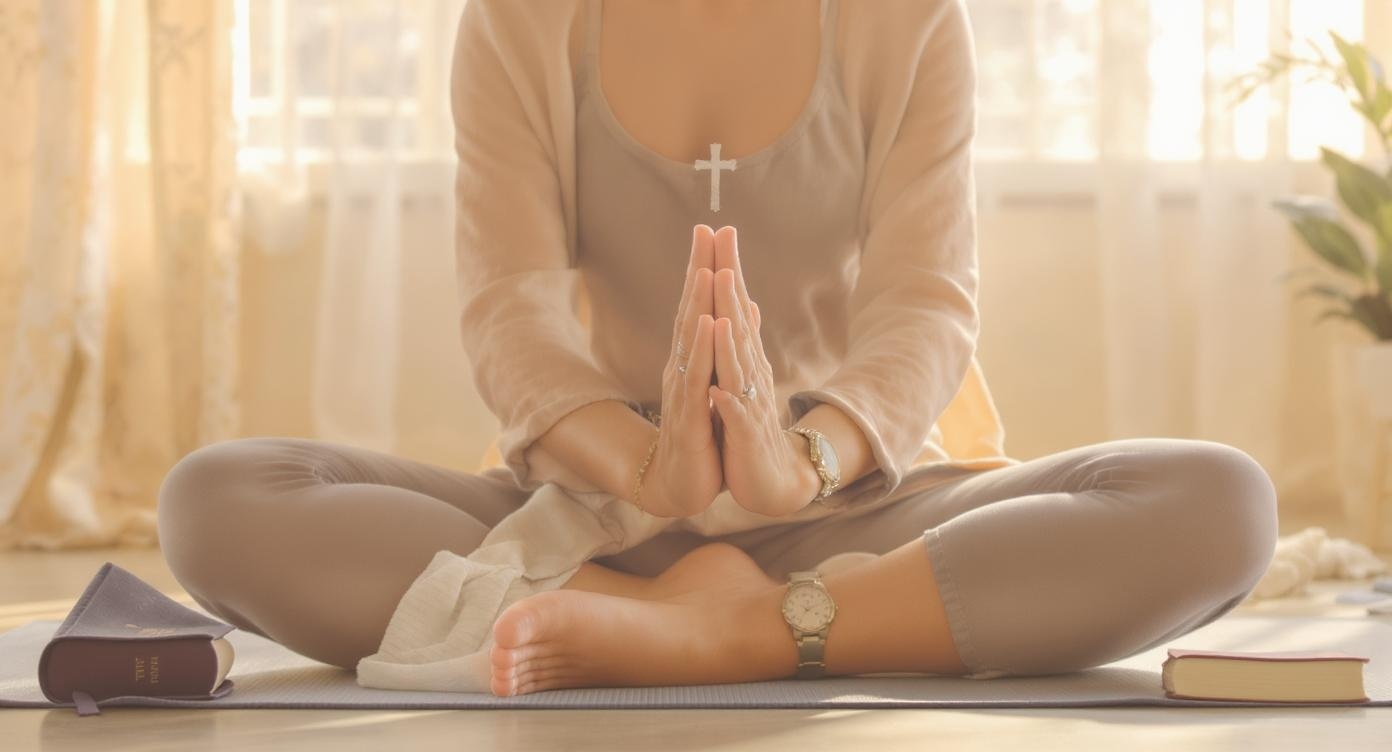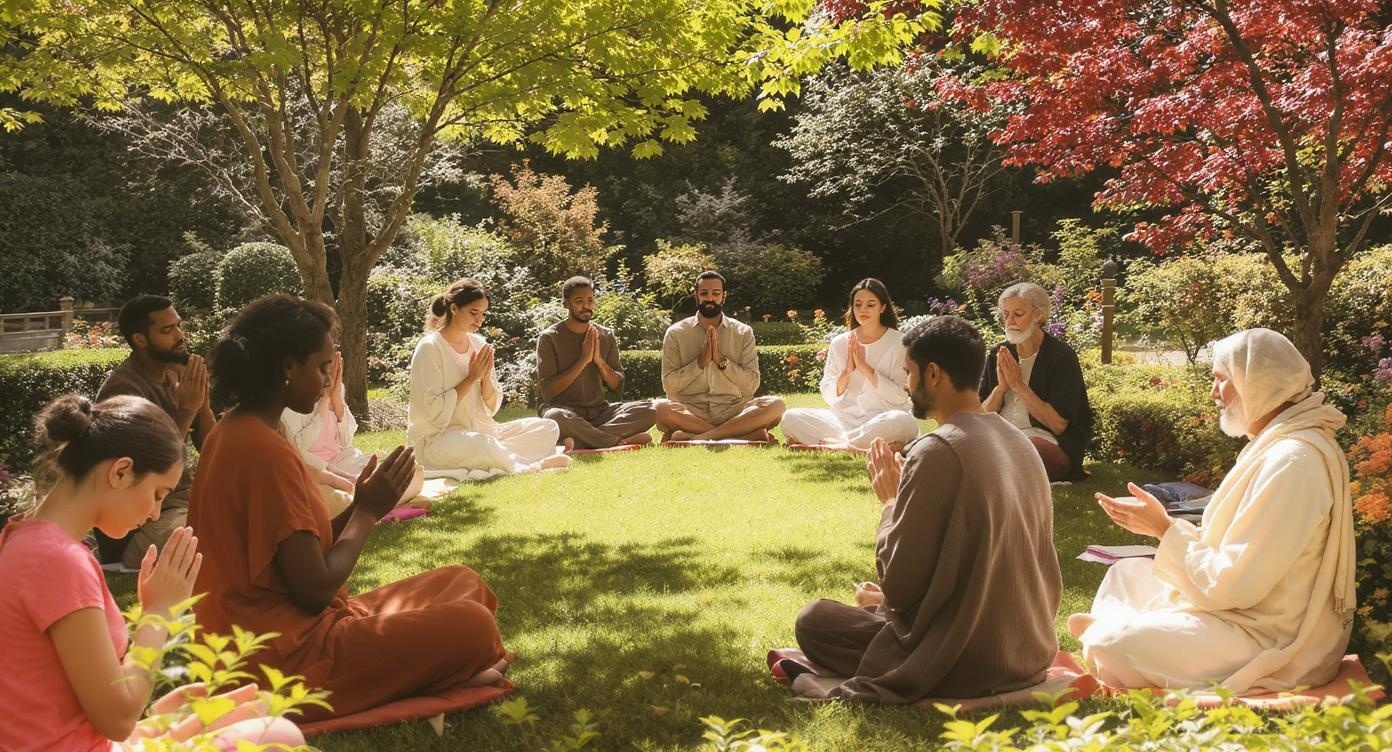Is Yoga a Sin? The Complete Guide to Faith, Freedom, and Finding Your Truth
Most Christians who ask "Is yoga a sin?" aren't looking for someone else to make their decision for them. They're seeking wisdom to navigate the complex intersection of ancient practice and modern faith. This isn't about right or wrong answers—it's about finding YOUR answer.

Finding harmony between physical practice and spiritual faith
Three years ago, I stood in front of my yoga class, hands pressed together at heart center, when a student approached me after class. "I love how I feel here," she whispered, "but my pastor says I'm inviting demons into my life. What do I do?"
Her question haunted me for weeks. Not because I had an easy answer, but because I recognized the genuine spiritual wrestling behind it. This wasn't about exercise—it was about identity, faith, and the fear of unknowingly compromising something sacred.
Here's what I've learned after countless conversations with pastors, yoga teachers, and believers caught in between: The question "Is yoga a sin?" reveals something profound about the person asking it. It shows someone who takes their faith seriously enough to examine their choices.
The Hidden Psychology Behind the Question
Robert Greene teaches us that understanding motivation reveals more than surface-level analysis ever could. When someone asks if yoga is sinful, they're really asking three deeper questions:
The Identity Question: "Who Am I?"
Your spiritual identity forms the lens through which you view every choice. If you see yourself as someone who must avoid all appearance of evil, yoga's Eastern origins become immediately problematic. If you see yourself as free in Christ to discern wisdom wherever it's found, the same practice becomes a gift to steward responsibly.
The Authority Question: "Who Decides?"
Some believers delegate spiritual decision-making to church leadership. Others take personal responsibility for studying scripture and seeking God's guidance. Neither approach is inherently wrong, but recognizing your pattern helps explain why this question feels so weighty.
The Fear Question: "What If I'm Wrong?"
The fear of accidentally compromising your faith runs deeper than the fear of missing out on yoga's benefits. This reveals a heart that honors God—even if the conclusion leads in unexpected directions.
A Pastor's Perspective
David Miller, senior pastor of Grace Community Church, struggled with this question when his wife started attending yoga classes for chronic back pain. "I realized I was more concerned with what people would think than what God actually said. After months of study and prayer, we found a path that honored both her physical needs and our spiritual convictions."
What the Bible Actually Says (And Doesn't Say)
Here's the uncomfortable truth that both yoga advocates and critics often ignore: The Bible never mentions yoga. Not once. This silence creates interpretive space that believers fill with principles, applications, and sometimes assumptions.
The Scriptural Framework
Since scripture doesn't address yoga directly, believers apply broader biblical principles:
1. The Idolatry Principle (Exodus 20:3-4)
"You shall have no other gods before me. You shall not make idols."
Application: If yoga practice involves worship of Hindu deities or philosophical systems that compete with biblical truth, this principle applies clearly.
2. The Liberty Principle (1 Corinthians 10:23-24)
"All things are lawful, but not all things are helpful. All things are lawful, but not all things build up."
Application: Even if yoga isn't explicitly forbidden, wisdom asks whether it builds up your faith and serves others.
3. The Conscience Principle (Romans 14:22-23)
"Blessed is the one who has no reason to pass judgment on himself for what he approves. But whoever has doubts is condemned if he eats, because the eating is not from faith."
Application: If practicing yoga violates your conscience or creates doubt about your faithfulness to God, abstaining may be the wisest choice.
4. The Stumbling Block Principle (1 Corinthians 8:9)
"But take care that this right of yours does not somehow become a stumbling block to the weak."
Application: Your freedom to practice yoga shouldn't cause other believers to stumble or question their own faith journey.

Scripture provides principles for navigating questions the Bible doesn't address directly
The Spectrum of Christian Responses
After surveying hundreds of believers, I've identified four primary approaches Christians take to yoga. Understanding these perspectives helps you locate your own convictions.
Position 1: Complete Avoidance
Core Belief: Yoga's Hindu origins make it incompatible with Christian faith, regardless of how it's practiced.
Biblical Basis: Deuteronomy 12:29-31 warns against adopting pagan worship practices.
Practical Approach: Seek alternative forms of exercise and stress relief that don't carry spiritual baggage.
Position 2: Cautious Separation
Core Belief: Physical yoga postures can be separated from spiritual elements with careful boundaries.
Biblical Basis: 1 Corinthians 10:25-26 suggests freedom to participate in cultural practices when done unto the Lord.
Practical Approach: Attend fitness-focused classes, avoid spiritual language, and maintain Christian meditation during practice.
Position 3: Redemptive Integration
Core Belief: God's truth can redeem and transform cultural practices for His glory.
Biblical Basis: Acts 17:28 shows Paul quoting pagan poets to communicate biblical truth.
Practical Approach: Practice yoga with Christian meditation, scripture, and prayer, transforming the experience into worship.
Position 4: Contextual Freedom
Core Belief: Mature believers can discern appropriate engagement based on their specific calling and context.
Biblical Basis: 1 Corinthians 9:19-23 describes becoming "all things to all people" for the sake of the gospel.
Practical Approach: Engage thoughtfully with yoga in ways that serve both physical health and missional opportunities.
The Truth About Yoga's Origins
Modern yoga as practiced in Western studios differs significantly from ancient Hindu spiritual disciplines. While acknowledging these roots matters, many yoga classes focus purely on physical postures, breathing, and stress relief without religious content. Context matters more than origin stories.
The Science of Spiritual Decision-Making
Alex Hormozi's framework for business decisions applies powerfully to spiritual choices: identify the real problem, analyze the options, test small, and scale what works. Here's how this applies to the yoga question:
Identify the Real Problem
Are you asking about yoga because:
- You need physical exercise and stress relief?
- You're attracted to spiritual practices that feel meaningful?
- You're seeking community and belonging?
- You want to honor God while caring for your body?
Analyze Your Options
Each position on yoga offers different benefits and costs:
- Avoidance: Clear conscience, potential missed physical benefits
- Separation: Physical benefits, requires constant vigilance
- Integration: Holistic approach, requires theological confidence
- Freedom: Contextual wisdom, requires spiritual maturity
Test Small
Start with low-stakes experiments:
- Try Christian yoga videos at home
- Attend one fitness-focused class and observe your heart
- Discuss your questions with trusted spiritual mentors
- Study scripture passages related to your specific concerns

Different believers can reach different conclusions while maintaining unity in Christ
Your Personal Faith Assessment
Ready to move beyond others' opinions to discover your own convictions? This assessment helps you process the yoga question through your unique spiritual lens.
Personal Faith & Yoga Assessment
Discover which approach to yoga aligns with your faith convictions
Your Recommended Approach
Based on your responses, here's the approach that best aligns with your spiritual convictions and practical needs.
Practical Wisdom for Moving Forward
Regardless of where you land on the yoga question, these principles will serve you well in this and other areas where faith intersects with culture:
1. Own Your Decision
Don't let fear of judgment—from either yoga enthusiasts or religious critics—drive your choice. Make a decision you can stand behind based on your study, prayer, and convictions.
2. Stay Connected to Scripture
Whatever you choose, maintain regular Bible study and prayer. If yoga enhances your relationship with God, that's a good sign. If it displaces or competes with spiritual disciplines, reassess.
3. Monitor Your Heart
Pay attention to the fruit in your life. Are you becoming more loving, patient, and Christ-like? Or do you notice spiritual dryness, confusion, or distance from God?
4. Respect Others' Convictions
Your freedom to practice (or avoid) yoga shouldn't become a source of judgment toward those who choose differently. Unity in Christ transcends these secondary issues.

Personal reflection and Scripture study guide wise spiritual decisions
Common Misconceptions Debunked
Misconception 1: "All Yoga is Hindu Worship"
Reality: While yoga has Hindu roots, modern Western yoga often focuses purely on physical postures and breathing techniques. Many classes have no religious content whatsoever.
Misconception 2: "Christians Who Do Yoga Aren't Serious About Faith"
Reality: Many mature believers practice yoga as a form of stewardship of their physical bodies while maintaining strong Christian convictions.
Misconception 3: "Yoga Automatically Opens Doors to Demonic Influence"
Reality: While spiritual warfare is real, God's protection over His children doesn't evaporate through physical exercise. Intentional engagement with occult practices is different from stretching and breathing.
Misconception 4: "There Are No Good Alternatives to Yoga"
Reality: Pilates, tai chi, stretching routines, and Christian movement practices can provide similar physical benefits for those who prefer alternatives.
Your Next Steps
If you've read this far, you're serious about making a wise decision. Here's your action plan:
Week 1: Study
- Read the biblical passages mentioned in this article
- Research different styles of yoga available in your area
- Talk to Christians on different sides of this issue
Week 2: Pray
- Ask God for wisdom and guidance
- Consider fasting as you seek direction
- Journal your thoughts and concerns
Week 3: Test
- Try a small experiment based on your convictions
- Monitor your spiritual, mental, and physical responses
- Seek feedback from trusted mentors
Week 4: Decide
- Make a decision you can stand behind with integrity/li>
- Communicate your decision lovingly to those who might question it
- Move forward with confidence in God's grace
- Honoring God in all their choices
- Studying Scripture diligently
- Seeking wise counsel
- Maintaining unity with other believers
- Showing grace to those who disagree
- Cultural engagement: How do we live faithfully in a diverse world?
- Biblical interpretation: How do we apply timeless truths to contemporary questions?
- Christian community: How do we maintain unity while allowing for different convictions?
- Personal discipleship: How do we grow in wisdom and spiritual maturity?
- Romans 14: Dealing with disputable matters
- 1 Corinthians 8-10: Christian freedom and responsibility
- Colossians 2: Freedom from human regulations
- Galatians 5: Walking by the Spirit
- What does honoring God with my body look like in this situation?
- How does this decision affect my relationship with Christ?
- What would love for my neighbor look like in this choice?
- Am I making this decision from faith or fear?
- PraiseMoves: Christian alternative to yoga poses
- Pilates: Core-focused exercise with no spiritual elements
- Tai Chi: Gentle movement for balance and flexibility
- Stretching routines: Simple flexibility exercises
- Walking meditation: Combining prayer with gentle movement
A Personal Note
After years of wrestling with this question personally and helping others navigate it, I've learned that the "right" answer isn't the same for everyone. What matters is that you approach the decision with genuine faith, careful thought, and love for God and others. Whether you practice yoga, avoid it entirely, or find a middle ground, do it as unto the Lord.
Building Bridges, Not Walls
The yoga question reveals a deeper challenge facing modern Christianity: How do we engage thoughtfully with a pluralistic culture while maintaining biblical fidelity? The answer isn't found in rigid rules but in mature discernment.
Some of the most spiritually mature believers I know have reached different conclusions on this issue. What unites them isn't their position on yoga but their commitment to:
The Bigger Picture
Ultimately, the question "Is yoga a sin?" points to something more significant than exercise preferences. It reveals our approach to:
These bigger questions will serve you far beyond the yoga debate. They're the tools for navigating countless decisions where faith intersects with daily life.
Finding Peace in the Process
Maria Santos spent months agonizing over the yoga question after her doctor recommended it for chronic pain. "I finally realized I was more focused on getting the 'right' answer than on seeking God's heart. When I shifted my focus to knowing Him better, the decision became clear. I found a Christian yoga instructor who helps me honor God while caring for my body."
Resources for Further Study
Biblical Passages for Meditation
Questions for Personal Reflection
Alternative Practices to Consider
A Word of Caution
Whatever you decide about yoga, be wary of spiritual pride on either side. Those who practice yoga shouldn't look down on those who abstain as "legalistic." Those who abstain shouldn't judge practitioners as "compromised." The goal is maturity in Christ, not winning arguments about secondary issues.
Final Thoughts: Grace for the Journey
As I finish writing this, I'm reminded of the student who first sparked my deep thinking about this question. After months of prayer and study, she found a path that honored both her physical needs and spiritual convictions. More importantly, the process deepened her relationship with God and her understanding of Christian freedom.
That's what I hope for you too. Whether your conclusion leads you toward yoga, away from it, or somewhere in between, may the journey deepen your faith, sharpen your discernment, and increase your love for God and others.
The question "Is yoga a sin?" doesn't have a one-size-fits-all answer because God has given us the gift of conscience, the guidance of Scripture, and the wisdom of community to navigate these waters individually. Trust the process. Seek God's heart. Make your decision with confidence.
Your spiritual journey is unique, and so is your calling to honor God in all you do. Whether that includes yoga or not is between you and Him.
Continue Your Spiritual Journey
Questions about faith and practice are signs of a growing heart. At Karma Teachers, we support believers who want to integrate mindful movement with their spiritual convictions.
Our training programs help you develop discernment for navigating the intersection of ancient practices and modern faith.


